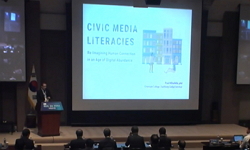본 논문은 제2차 세계 대전 동안 불가리아의 유대인 문제 접근 방식을 통해 위기 해결의 역학을 분석하는 것을 목적으로 한다. TMI/3R 방법론을 사용하여, 위기의 시작, 영향, 불가리아의 전략...
http://chineseinput.net/에서 pinyin(병음)방식으로 중국어를 변환할 수 있습니다.
변환된 중국어를 복사하여 사용하시면 됩니다.
- 中文 을 입력하시려면 zhongwen을 입력하시고 space를누르시면됩니다.
- 北京 을 입력하시려면 beijing을 입력하시고 space를 누르시면 됩니다.

A Study on the Dynamics of Crisis Resolution - Analysis of Bulgaria's Approach to the Jewish Problem during World War II
한글로보기https://www.riss.kr/link?id=A109104338
- 저자
- 발행기관
- 학술지명
- 권호사항
-
발행연도
2024
-
작성언어
-
-
주제어
위기 관리 ; 홀로코스트 저항 ; 시민 사회 ; 유대인 문제 ; 불가리아 ; Crisis Management ; Holocaust Resistance ; Civil Society ; Jewish Problem ; Bulgaria
-
KDC
300
-
등재정보
KCI등재
-
자료형태
학술저널
-
수록면
99-114(16쪽)
- 제공처
-
0
상세조회 -
0
다운로드
부가정보
국문 초록 (Abstract)
본 논문은 제2차 세계 대전 동안 불가리아의 유대인 문제 접근 방식을 통해 위기 해결의 역학을 분석하는 것을 목적으로 한다. TMI/3R 방법론을 사용하여, 위기의 시작, 영향, 불가리아의 전략적 대응, 회복 및 재구성 노력을 살펴보며 독일 당국, 불가리아 지배 엘리트, 군주제, 불가리아 정교회, 시민 사회를 포함한 주요 이해관계자들 간의 의사소통 채널과 권위 역학을 분석하였다. 홀로코스트의 광범위한 참혹함에도 불구하고 불가리아는 병합된 영토의 유대인을 제외한 자국 유대인을 나치 강제 수용소로의 추방에서 보호하는 데 성공했다. 이 가운데 불가리아 시민 사회, 정교회, 그리고 보리스 3세 황제가 위기 관리에서 맡은 중추적인 역할과 반유대법 제정과 사회적 반발, 비밀 추방 계획, 보리스 3세 사망 이후의 긴장 완화 단계까지의 과정을 추적하였다. 분석 결과, 시민 사회의 하향식 접근 방식이 전통적인 계층적 의사소통을 방해하고 주요 결정에 영향을 미친 것을 알 수 있었다. 불가리아의 사례를 검토함으로써, 효과적인 위기 해결 전략에 대한 귀중한 교훈을 제공하고, 의사소통, 사회적 회복력 및 정치적 저항과 인도주의적 보호에서 도덕적 의무의 중요성을 살펴보고자 하였다.
다국어 초록 (Multilingual Abstract)
This study aims to analyze the dynamics of crisis resolution through Bulgaria's approach to the Jewish Question during World War II. Using the TMI/3R methodology, it examines the inception, impact, and Bulgaria's strategic response, recovery, and reco...
This study aims to analyze the dynamics of crisis resolution through Bulgaria's approach to the Jewish Question during World War II. Using the TMI/3R methodology, it examines the inception, impact, and Bulgaria's strategic response, recovery, and reconstitution efforts. The analysis focuses on communication channels and authority dynamics among key stakeholders, including German authorities, Bulgarian ruling elites, the Monarchy, the Bulgarian Orthodox Church, and civil society. Despite the widespread devastation of the Holocaust, Bulgaria successfully protected its Jewish citizens from deportation to Nazi concentration camps, except for Jews from annexed territories. This study highlights the pivotal roles played by Bulgarian civil society, the Orthodox Church, and Tsar Boris III in crisis management. It traces the phases from the enactment of anti-Semitic laws and societal opposition to covert deportation plans and the de-escalation following Tsar Boris III’s death. The analysis reveals how a bottom-up approach from civil society disrupted traditional hierarchical communication and influenced key decisions. By examining the Bulgarian context, this research provides valuable lessons on effective crisis resolution strategies, emphasizing the importance of communication, societal resilience, and moral imperatives in political defiance and humanitarian preservation.
목차 (Table of Contents)
- I. Introduction
- II. Trigger, Magnitude, and Resolution: The Multifaceted Dynamics of Bulgaria’s Holocaust Crisis Management
- III. Analyzing the Dynamics and Stakeholder Roles in Bulgaria's Holocaust Crisis Management
- IV. Conclusion: Bulgaria's Crisis Management Insights
- Reference
- I. Introduction
- II. Trigger, Magnitude, and Resolution: The Multifaceted Dynamics of Bulgaria’s Holocaust Crisis Management
- III. Analyzing the Dynamics and Stakeholder Roles in Bulgaria's Holocaust Crisis Management
- IV. Conclusion: Bulgaria's Crisis Management Insights
- Reference
동일학술지(권/호) 다른 논문
-
Modern Gender Gap in Presidential Approval Ratings in South Korea
- 호남대학교 인문사회과학연구소
- 신희주(Heeju Shin)
- 2024
- KCI등재
-
20대 남성의 신경성 폭식 경험 및 극복의 의미 탐색을 위한 사례연구
- 호남대학교 인문사회과학연구소
- 김남금(Nam geum Kim)
- 2024
- KCI등재
-
A Study on Korean Nail Salon Women and Nail Beauty in New York
- 호남대학교 인문사회과학연구소
- 한정우(Jeong-woo Han)
- 2024
- KCI등재
-
아동기 외상이 폭식에 미치는 영향에서 신체수치심의 매개효과 및 성별에 따른 다집단분석
- 호남대학교 인문사회과학연구소
- 김용희(Yonghee Kim)
- 2024
- KCI등재




 스콜라
스콜라






